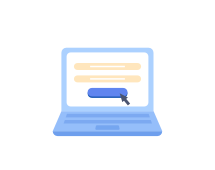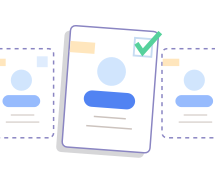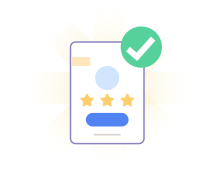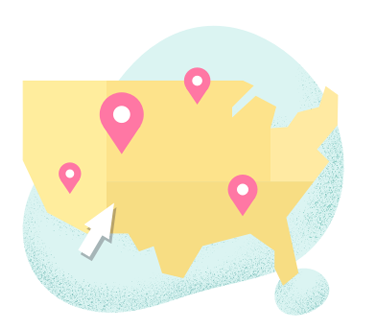

Find the right small business insurance

Enter your information just once, in one application

Compare business insurance quotes from top providers

Choose the best rate and coverage for your business
What is commercial insurance?
A small business takes a lot of time, energy, and money to run successfully. As a business owner, you want to protect that investment and grow your revenue.
Commercial insurance, also called business insurance, can shield your business from costly risks like injuries, theft, property damage, and lawsuits.
Small business owners can purchase different types of commercial insurance coverage, which compensate them for financial losses arising from a variety of situations.
Commercial insurance protects a business from standard risks, or liabilities, including:
- Client lawsuits
- Property damage and theft
- Customer or employee bodily injury
- Unexpected events, like a natural disaster
It won't protect a business against everything, but business insurance coverage can be a lifesaver in potentially expensive situations.
What are the different types of commercial insurance?
Here are some of the most common commercial insurance policies you'll come across.
General liability insurance
This policy protects you from basic risks that most small businesses face, such as customer injuries and property damage, and advertising injuries. It's often required by client contracts and commercial leases.
- Client accidents and injuries
- Accidental damage to client property
- Libel, defamation, and copyright lawsuits
Business owner's policy
A BOP bundles commercial property and general liability coverage into one plan. It's typically the most cost-effective type of coverage for small businesses.
- Customer bodily injuries
- Damaged business property
- Business interruption incidents
Errors and omissions insurance (E&O)
Also called professional liability insurance, this policy covers legal expenses if a customer sues you over unsatisfactory results, errors, or delays.
- Work errors and oversights
- Accusations of negligence
- Missed deadlines
Workers' comp insurance
Workers' compensation insurance is required in almost every state for businesses with employees. It can cover medical costs for work-related injuries.
- Employee medical expenses
- Disability benefits
- Lawsuits from workplace injuries
Cyber insurance
Cyber liability insurance protects small businesses from the financial impact of data breaches and cyberattacks. It's important to have if you handle sensitive customer information, like credit cards.
- Data breach investigations
- Client notification expenses
- Fraud monitoring costs
Commercial auto insurance
Commercial car insurance covers company-owned vehicles in the event of accidents or injuries, as well as theft, vandalism, and other damages.
- Car accidents
- Vandalism and theft
- Weather damage
How much does commercial insurance cost?

From our customer data, here's a quick look at the typical costs of common policies:
General liability: $45 per month
Professional liability: $61 per month
Workers' compensation: $54 per month
View more commercial insurance costs.
Several factors affect policy costs during underwriting, including:
- Industry and risk factors
- Policy limits
- Location
- Number of employees
- Additional coverage
Start a free quote to see how much insurance will cost your business.
Hear from business owners like you who purchased insurance coverage.
Commercial insurance requirements in your state
In most cases, states legally require a business to have workers' compensation insurance if it has employees.
Most states also require commercial auto insurance for vehicles registered to a business.
However, a business may also be contractually required to carry specific insurance products. If you lease a building or office space, for example, your landlord will probably require you to have general liability insurance. And if you take on a large business client, they'll likely ask that you have errors and omissions insurance.
Even when it's not required, insurance coverage can provide crucial protection against the risks of running a small business.
Which policies does your state require for small businesses?

Commercial insurance policy details
Every type of business insurance comes with its share of paperwork and fine print, and commercial liability insurance is no different. Any plan you purchase will probably include:
- Premium: This is the amount a business pays for insurance coverage, or the price of the policy. Factors such as business type, number of employees, location, payroll, years in business, and exposures can all impact your premium amount. Payment terms can be set as monthly, quarterly, or annually.
- Deductible: Your deductible is the amount you must pay towards a claim before the insurance provider will offer its funds. For example, if you have a $10,000 deductible and a lawsuit costs your business $50,000, your insurance would pay $40,000.
- Policy limits: This represents the maximum total amount of money that the insurance policy will pay out. Typically, there's a limit per claim (per-occurrence limit), and a limit per the life of a policy (aggregate limit). Many commercial liability policies have a $1 million per-occurrence and $2 million aggregate limit.
- Coverages and exclusions: The coverage section in an insurance policy details what the policy can and will pay for. Exclusions outline what isn't covered. A standard exclusion in a liability policy, for example, says that insurance won't pay the costs if you intentionally harm another person.
Pay attention to the details of your policy so you know what's included and which type of commercial insurance coverage is right for you. Talk to your insurance agent if you have any questions.

Liability insurance can protect you from risks and help your business meet contract requirements. Here’s how to decide which coverage limits you need for your liability policies.
Common questions about commercial insurance
Review answers to frequently asked questions (FAQs) about commercial insurance and more.
What is the best way to choose commercial insurance coverage?
When speaking with your insurance agent, they'll be able to help you determine your insurance needs and the right amount of coverage based on your business and type, how much business personal property you have, and other factors. You'll want to make sure your coverage meets any insurance requirements set by your state and local laws, your clients, and your industry.
Read more about the different types of coverage options you might need.
How does commercial insurance work?
Essentially, commercial insurance policies pay for financial losses suffered by your business.
Let's say someone breaks into your office and steals several laptops. You file a claim with your commercial insurance provider. They investigate the claim, assess the damage, and then offer you the funds to buy new laptops and replace the window that the burglar smashed.
Other claims might be a bit more complicated. A liability claim, for example, often involves a lawsuit against your business. In these situations, a customer, client, or unrelated third party believes your business caused them financial damage and wants compensation from you.
If someone sues your business for an event covered by your policy, your insurance provider will likely connect you with an attorney to take charge of your legal defense. The attorney will either defend your case in court, or offer to settle with the plaintiff.
All of the costs associated with the lawsuit are paid by the insurance provider, up to your policy limits, after you've paid your deductible. This includes attorney's fees, court costs, and any settlement or judgment amount.
How do I file a commercial insurance claim?
The first step is to reach out to the insurance agency that provides the policy. They'll begin an investigation into your commercial insurance claim, including assessing the damage and providing you with any next steps. If your claim is approved, it'll be subject to any out-of-pocket deductible and coverage limits included in your policy.
Should someone sue you or your business for financial damages, if they're covered by your insurance, your insurance provider will connect you with an approved attorney to represent you in court or to help settle the claim.
What's the difference between commercial vs. personal insurance?
It can be confusing when breaking down the differences between personal and commercial insurance. This is especially true when certain commercial policies cover things like bodily harm and injury. Ultimately, the difference comes down to where the claim happens and why it happens.
Commercial insurance covers accidents, mishaps, and other incidents that occur while working, using company property, and on the jobsite. Personal insurance covers matters not related to a work environment.
Business property, employee, or client claims involving an accident, injury, problem, or event during business operations, will be covered by commercial insurance. Many types of insurance cover different aspects of running a business, such as commercial vehicle insurance, commercial property insurance, and even cyber insurance.
Conversely, personal insurance covers non-work related accidents, illnesses, and injuries, such as a cold or flu or a broken arm from a fall at home. There are non-medical types of personal insurance as well, including personal auto, life, homeowners, and property coverage insurance.
Get free commercial insurance quotes
TechInsurance helps small business owners compare commercial insurance quotes from leading insurance companies. Get quotes today and find the right coverage for your business at the most affordable prices.
If you still have questions about commercial insurance, check out our small business insurance FAQ.